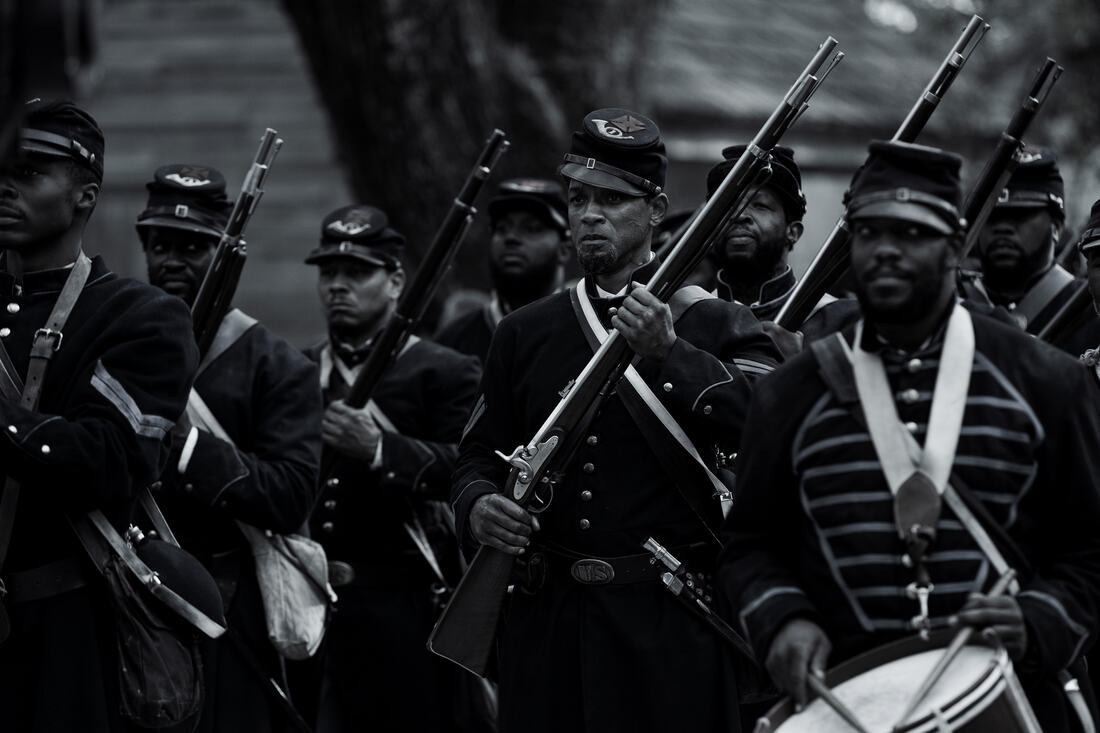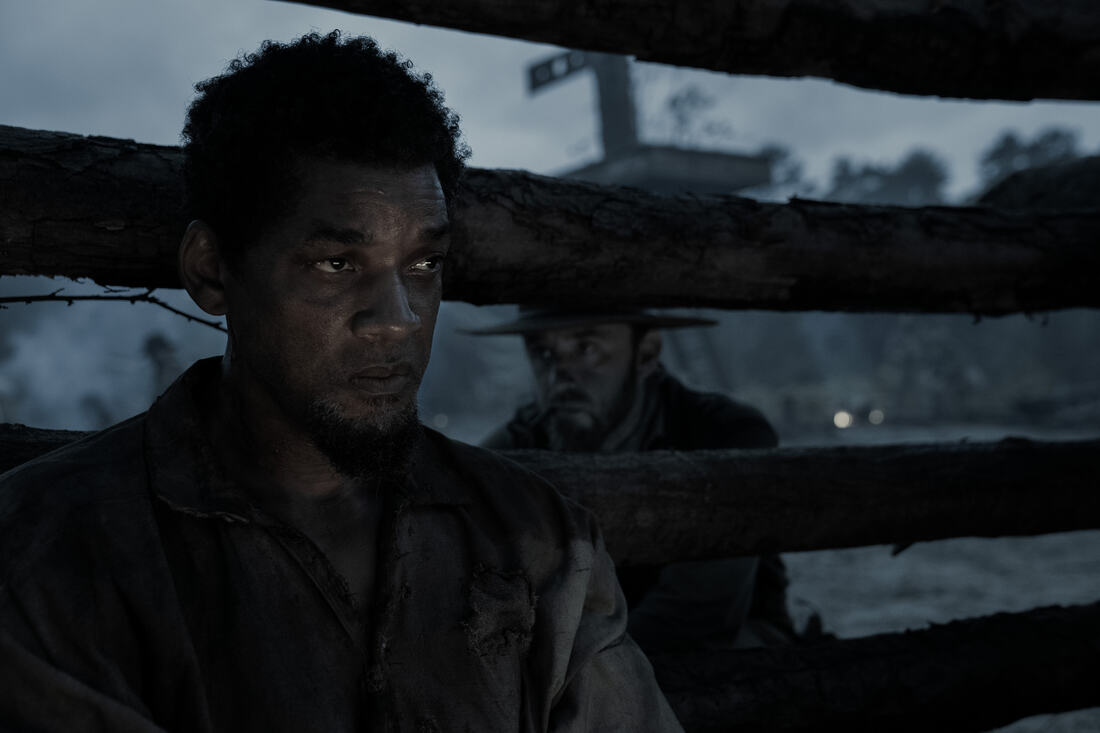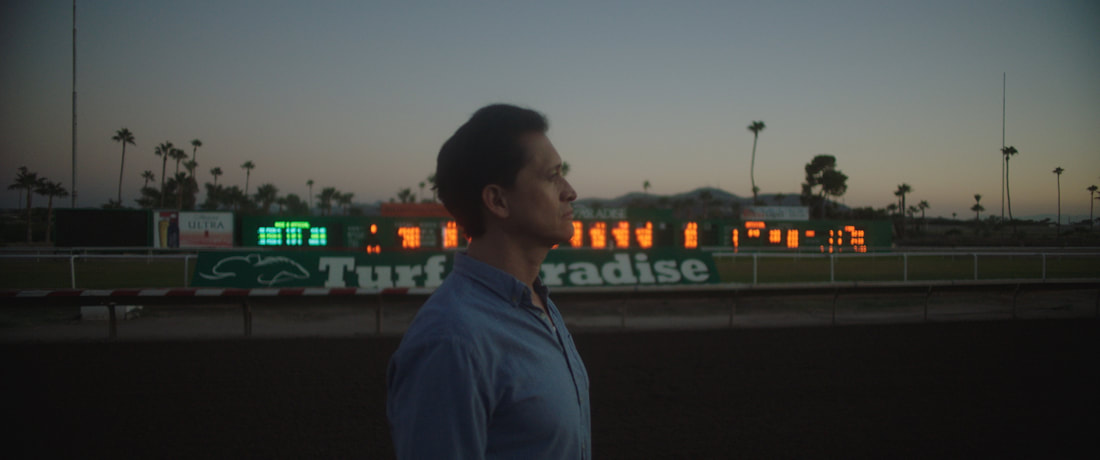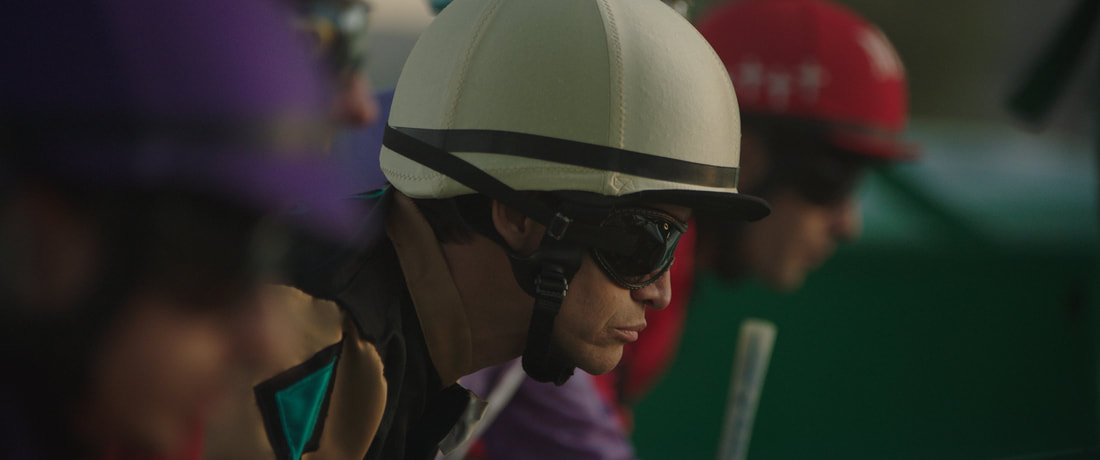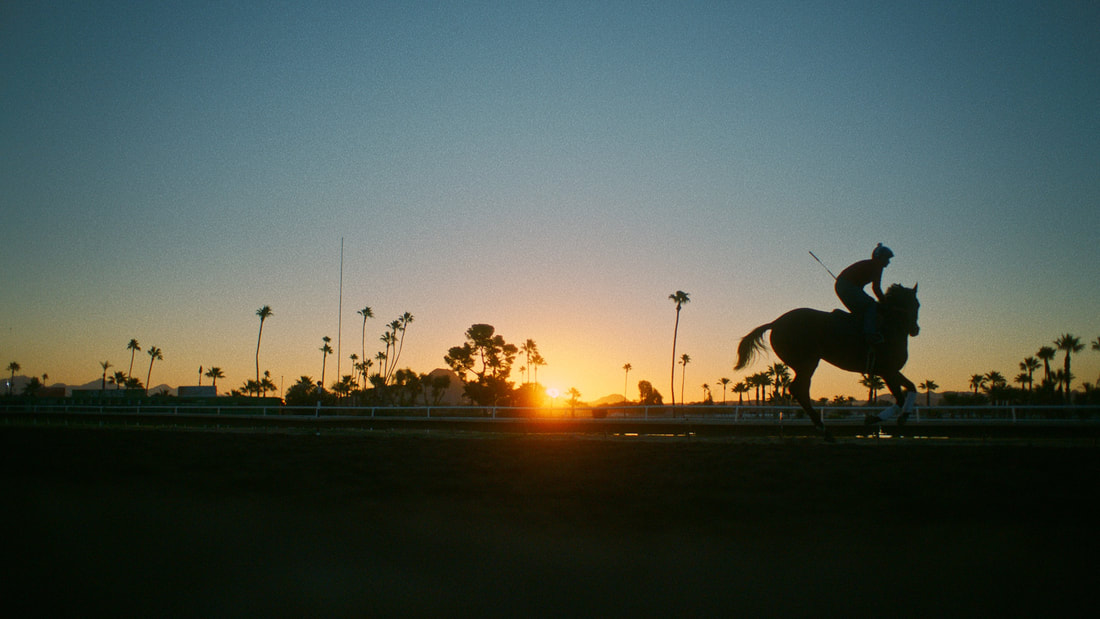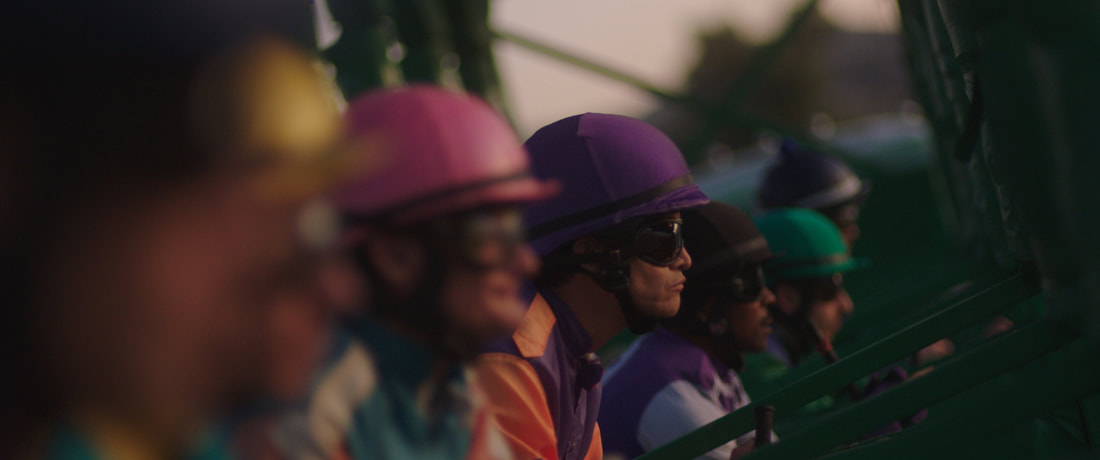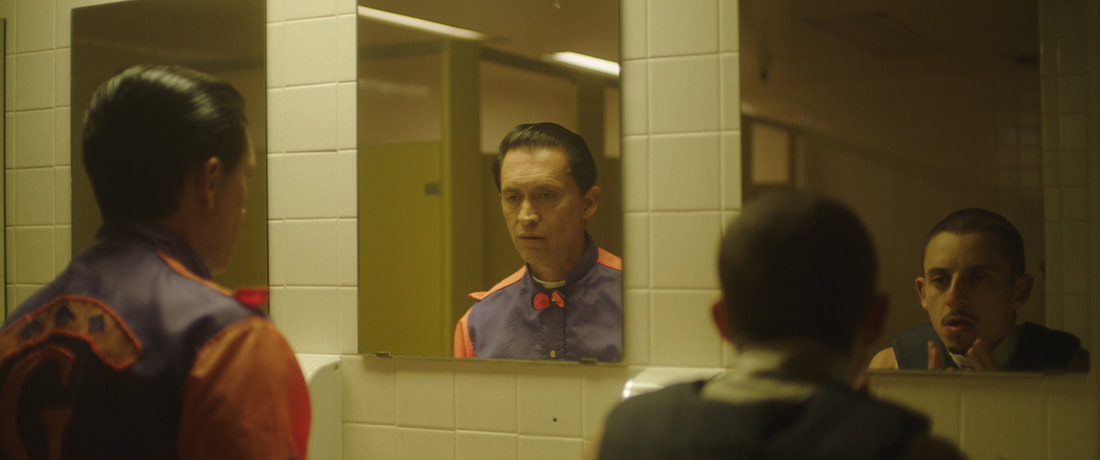|
Interview by Dan Skip Allen Antoine Fuqua’s new drama Emancipation, starring Will Smith in a story inspired by the picture of “Whipped Peter,” is considered to be a strong awards contender for several below-the-line awards. We at disappointment media got the opportunity to speak with several of the craftspeople behind the film, including VFX supervisor Rob Legato, costume designer Francine Jamison-Tanchuck, production designer Naomi Shohan, editor Conrad Buff, cinematographer Robert Richardson, and re-recording mixer Steve Pederson. disappointment media: How did you get the look of the film and the splashes of color and make it look seamless? Rob Legato: Part of what we did when we were coming up with the look for the film is that, instead of going full black and white, we would first adjust the different colors — red, green, and blue contributions — to that black and white. Like if you had a red shirt on, and you were to change the contribution of that particular color layer, you can adjust its gray value to anything that you want. You're able to kind of fine-tune match it and then mix a little of the color back in. And then on top of that, if we want to add a little red or a little green or a little from the foliage, we could do that. But so what we had is complete control as if it was all black and white. We could change any costume or any shade to whatever gray value seemed to make the most sense or look the most pleasing or match and then mix back color into that. So we were able to creatively create this palette that Bob [Richardon] would sit in with dailies colorist Benny, and every day make the subtle artistic adjustments. So that, mixed with the costumes and the art direction, we were able to very finely control it for artistic reasons. Bob would sit with the colorist every day and make these very subtle adjustments based on the drama that he and Antoine [Fuqua] had worked out. It was a fun collaboration. It was very fun to do it and come up with something because the look was so wonderful for the film, that we were very excited every day to come out of dailies and we would find something that we really liked that played the drama very well. Francine Jamison-Tanchuck: I agree with Rob. My collaboration with Bob Richardson and Antoine and Naomi [Shohan] every day or at least once a week was to find out what these colors are going to do on screen — figuring out how much over dyeing it needed or if it had to be dyed at all, or aged, and how all of that blends in and just makes it appear to be seamless. So I think with Bob's wonderful photography, and with Naomi’s sets, with all of that came Antoine's vision of what that is and what that could be. And the sense of as Peter is running, and the way that he is going through a lot of the terrain and a lot of the sense of what he is encountering along the way, all of that has to be really reviewed on how that works and how that translates with the costumes and what happens with them along the way. I feel by viewing the film, it really did work. A lot of that is because of collaborating with all of the department heads and people who really know their profession, and just making it all work together. I think we all felt that it was a story that really had to be told and wanted it to be told realistically. Naomi Shohan: The choice of the way color was used here that Bob and Rob have been discussing, there's kind of a distancing that happens with black and white that also creates intimacy. So there's this contradiction in terms that works very beautifully to allow you to both receive the movie and also kind of look at it as a time-out-of-time experience. I also want to say that everybody did a lot of research on this project. We all had a pretty good visual understanding, at least, of enough of what this world was in order to try to recreate it. Also, the landscapes that we used to film the movie are magnificent and Antoine had said that he wanted the movie to be both beautiful and brutal. As we explored them scouting for locations, they spoke eloquently to us. I think that the land had a little bit to say to us as well about what may have happened in the past, even our experience of how rugged it was to be living and working there. So the combination of historical research, the poetic distancing, and listening to the land — all of these things contributed to the unity of the end result and Antoine’s striving vision. disappointment: On all of his appearances to promote the film, the thing he mentioned that stood out was that he didn’t want to take away from the people that made this movie. You all deserve being championed. Would anyone like to comment on him standing up for the people like you behind the scenes? Conrad Buff: I think we all certainly appreciate it. We all know how much work was put into making this and how we all supported Antoine. You know, on the production end of things I was spared, of course, being in editorial and distant from Louisiana, but Antoine had so many challenges on this film. That sad incident with Will at the Academy Awards was like one more difficulty to overcome. So I know all of us certainly appreciate him acknowledging our work. He couldn't have been more lovely in my dealings with him, which were primarily in post production. Rob Legato: I only got to work with him a couple of times, but I got the impression just from working on this film, that his comment is how he really feels because he's appreciative every day. He was excited by the shots that Antoine and Bob would create that he would see playbacks of and all the contributions of everybody on the film productions on costume and everything. So he was, in my view, always in everyone's corner — everybody out collaborating, producing the movie. So I’m not terribly surprised that's the comment he would make about this and not wanting whatever happened to diminish the contribution he felt everybody made while we were making the movie. Not just as a response or nice thing to say afterwards, but as something that he feels rather deeply and as a performer, he's appreciative of the art form of everybody else who makes him look good. Robert Richardson: I agree with you totally, too. I think that Will’s spirit is one of giving. He was remarkable to work with. He led us, he sat on the set on the most difficult days and waited out. He didn't go to his trailer, he was with us. We all appreciated it. And of course, he continued that, despite what took place. And he's a true gentleman. Rob Legato: I remember when we were shooting the pit scene where we threw the older gentleman into the pit. I think he offered something like $5,000 to everybody who had to now lay in that pit in the hot sun. So he appreciated even that work that the extras were doing and the other people who were in it. He was always involved and always appreciative of the contribution and the difficulty of shooting this film, which was pretty difficult to shoot. High heat and thunderstorm and lightning conditions would interrupt shooting every so often. So he was a very generous man I have to say. Francine Jamison-Tanchuck: I totally agree with everyone that Will Smith has got to be one of the kindest, warmest, just understanding people I've ever worked with in front of the camera. He was just a very gracious person and he was just so appreciative of everyone's work. Especially with the type of character that this man was going through all these months. He is a human being first and his acting and everything comes next. But he was so professional and such a gracious person and who knows how that affected him later. But as far as working with all of us and just working with him in the fittings and on the set, there was not one time that he did not have a kind word for anyone and everyone. So I feel that he is just really the epitome of professionalism. He is the epitome of what it is to be a humble and gracious filmmaker. I just feel very honored to work with him any day, anytime, and to work with all of these wonderful filmmakers that are here now. And I'd like to say a comment to Bob Richardson, Bob Richardson, I do not care what color you are. To me you had your vision and what you did on this film, just brought it all to a reality that the entire world needs to know about and needs to see. And for as far as I'm concerned, you are an American, artistic, incredible cinematographer that Antoine in his vision knew that he needed that hand in order to make this to bring this to the screen. And also Naomi's wonderful sets and Cindy, and add all of the collaboration. It doesn't matter where you're coming from, what your your skin tone is, your gender, your age — it is about really having the compassion and knowing and seeing that something's wrong in this picture. There's something wrong when one human being has to brutalize a mother. And so in having that vision and having that scope, you really brought it, everyone brought it out and just brought it to a reality. And I commend everybody. Thank you so much. Steve Pederson: Being part of the mix, we're at the very end. And Will did come in for a playback when we basically had everything there, it was 95% done. Will came in and was so appreciative when the lights came up of what he had heard and seen. And it was very gratifying for us because we took inspiration, the slap aside, from what was on the screen. Thanks to everybody here and what you had done, we felt we needed to step up the sonic and meet that. It's such an important film, we had such a great time doing it. Will was appreciative and we're very appreciative of Will and what he did and his performance, that we all felt we had to rise to that level. And it was such a pleasure to meet him and to get his feedback and to see how he responded to our work. Emancipation is now streaming on Apple TV+.
0 Comments
Interview by Dan Skip Allen
It's always interesting to see a character that is predominantly known for being a character actor step into the leading role, and the extremely talented Clifton Collins Jr. gets that opportunity with the horse racing film Jockey. We at disappointment media got the opportunity to talk with Collins Jr. about the film and his role, including what he did to prepare for the film and his relationship with the cast and crew. Check out the interview at the link below!
On Preparing for the Role
disappointment media: Jockeys notoriously have a very rigorous training routine prior to their races, did you have a special routine you had to do to prepare for this challenging role?
Clifton Collins Jr.: Yeah, I was constantly doing calisthenics and similar workouts, what they were doing. In conjunction with that strict diet, that's probably not conducive to the type of workouts I was doing. But it did help me to get down to 143 pretty quickly. disappointment: Yeah, I bet that couldn't have been easy. Collins Jr.: No. [He laughs.] disappointment: How much experience did you have with with riding horses prior to working on this film? Collins Jr.: Quite a bit. But that was mostly on rodeo horses through Westworld. And I had the pleasure of working with some of the greatest horse wranglers that the industry has to offer. And those horses you know, you can run with them like you would drive a Porsche there's so accurate in like a precision sense. But the thoroughbreds are very, very different. They're like the dragsters of the horse world. So they're not going to be doing all the maneuvering that you can do on a rodeo horse on Westworld. These horses, you just hope to nudge a little to the left a little to the right. Maybe slow 'em a smidge, or let him go to go to the front of the line and hopefully take the win. And you're not sitting on the saddle, neither. You're up and you're you're leaning on the shoulders, you're leaning forward back, and you're in sync with the horse like a band member would be. But it's it's a life and death thing as well, in addition to a rush. disappointment: This is definitely a very intimate, emotional role. Did you approach this differently from some of the other characters you've played in the past? Collins Jr.: No. And I was fortunate enough to have a previous working experience with Greg Kwedar directing Transpecos and Clint Bentley producing. So there is a beautiful shorthand that was developed as a result of us collaborating together. And this one, the three of us very closely worked in really developing this, and then once Molly and Moises came to set a week early, we were able to get whatever intel that they were bringing to it as well because they were spending their own time with the trainer and with the the jockeys. But I was with the jockeys every single day, two weeks before we started shooting. On Jockey
disappointment: One of the most interesting things about the film as the father-son dynamic, how did you
approach this part of the story? Collins Jr.: Oh, very tenderly and painfully. I've got a past working relationship with Moises. We did a film called The Perfect Game. And there was five kids there that I mentored that I'm still fairly close to today, except now they're grown ass men. So it was fantastic to work with Moises and watch and become this young, cultured thespian. But you know, he has turned into an adult. So I had to like kind of like give him a heads up, "Yep, I am still an idiot, the same idiot you worked with last time. Obviously, you know, I'm gonna bring it. I'm gonna be here for you. Whenever you need me, you got access to me 24/7." So there was an element of trust there. But it was so painful too. So we explored a lot together. We went through a lot of the stuff. You know, sometimes Greg and Clint would be there in the room with me, then sometimes they wouldn't. But Moises and I, and also Molly and myself would also spend quite an amount of time in my room going through scenes and exploring the emotions and you know, what's really happening to hopefully evolve it because it was constantly evolving as we were shooting. disappointment: One of the most impressive things about your performance is how you were able to capture some of the small mannerisms that jockeys have. How did you work to perfect those? Collins Jr.: Honestly, it was really just sticking around. Just being in the jockeys' room because I was there all the time. I cut off my ties from L.A. so that I could just be completely consumed with that world. You know, so if I found out they're gonna watch a movie or this or that. You know, sometimes we go off and watch a movie that's out of the box. It's got nothing to do with jockey being a horse rider or any of that stuff. So I would shy away from that because if I can double dip and steal more for more of what was useful for the film and the role, I would do that. But it was really as a result of being with them and speaking to some of the retired jockeys as well. You know, I got to find out how they retired, why they retired. Did they retire on their own? Were they forced into it? You know, because a lot of these guys, they get paralyzed or injured or maimed. And then they may, they can still walk, and they have their facilities more or less, but they can't ride. They love it so much, they'll become an agent, or they'll become a trainer or all these other things. So, you know, picking their brains and that kind of stuff. disappointment: You've worked with Clint Bentley and Greg Kwedar before. How did that relationship progress with this film? Collins Jr.: It progressed in such a way that we can't wait to do our third film together. You know, there's a certain magic that happens when the three of us are working together, and you take any one of us out of the equation, it's just, it's not the same. So we developed a shorthand on Transpecos. You know, we maintained a friendship throughout the years. And they approached me for this one and they knew that I was going to want to jump in, they knew I was going to carry gear all those days we needed extra hands and help, and I want to be a team player. So it's a beautiful thing to have a filmmaker and a producer, two artists who belive you in such a way, and lean on you and use you that way. Because you're all leaning on each other. You can't make a movie by yourself, especially on this level. And that intimacy is beautiful, it's a family unit when you're making a movie.
Jockey hits theaters on December 29.
Interview by Dan Skip Allen
Jockey debuted at the 2021 Sundance Film Festival, where it was picked up by Sony Pictures Classics for a release in the thick of awards season. And while the sports genre is known for its saccharine crowd-pleasers, Clint Bentley's film takes a unique approach, both narratively and stylistically. We at disappointment media got the chance to talk with the film's director, Clint Bentley about his approach to making this film. Check out the interview below!
On Telling the Film's Story
disappointment media: What about the sport of horse racing stood out to as something you wanted to make a film about?
Clint Bentley: Actually, my dad was a jockey, and so I grew up in the world of horse racing, and I grew up behind the barns. And it really, it didn't seem that weird as a kid, because I had just grown up in it. But then, when I got a little older and became a filmmaker, I realized just what a strange, interesting kind of carnie life they lead, specifically jockeys and how I hadn't seen that really on film. And so I wanted to portray that. disappointment: Aging is a big part of a lot of people's lives. But how important was it to use this angle as part of Jackson Silva's life and struggles? Bentley: Yeah, it became something that my co-writer and co-producer Greg Kwedar and I were working on the script. And early on, the script was about a younger jockey. And Jackson was a supporting character in those earlier ideas of the movie. But then, he really hit on the idea that what Jackson is going through as a character, in this kind of aging out but not being ready to go and being used up but still having a lot of passion for this world is very similar to what the sport of horse racing is going through in general. And it kind of acts as a perfect metaphor for it. So we just leaned into that. On the Film's Unique Style
disappointment: The racing scenes are definitely unique within the genre of sports movies. What did you do to create the visual style in these portions of the film?
Bentley: Yeah, as I was doing doing early directing prep, I took all of the horse racing movies, and I pulled their races out. And then I cut them up in an editing program, in Premiere, to see like, "Okay, what was their shot selection in making these?" And what I found was like, they were all shot and cut exactly the same. And I couldn't tell once I got them all pulled apart and started putting them together, I couldn't tell which movie was this even from. And I just think that's because like, they only go one direction and there's only so many ways you can shoot it. But then once I got to a place where we were actually making the film, we didn't have much money, we had a very small crew. There wasn't really a way to safely do, even if I wanted to do a big race scene, there wasn't a way to safely do it. And so, you know, I really worked closely with Adolpho Veloso, my cinematographer, and we just tried to figure out, "Okay, if we can't do this and make it feel big in the way that we would normally see a race, how can we do in an interesting way?" And locking it close in on Jackson's perspective just fit the story. And so we were doing all sorts of these little tricks throughout, just to use our limitations to our advantage. And it helped to be on a live working racetrack where races were happening all the time. And we could just film our actors around it, you know? disappointment: The score by Aaron and Bryce Dresner is excellent. How did you work with them to create a sound for the film? Bentley: Greg and I had worked with them on our first film, Transpecos. And so we had a bit of a personal history there and a connection. And then when it came time to do this one, I really wanted a score that, like the movie, it had to kind of walk a tightrope where it I wanted it to be big and emotive, but not too big and kind of saccharin. But then be atmospheric but also not too slight. And Aaron and Bryce are just brilliant. They're brilliant composers. And once we kind of talked about the feelings that I wanted to get across with with not only the movie, but each scene, they just really ran with it and created something really beautiful. And also, they created in a way that was very scrappy, kind of like the way we shot the movie. On Realism in Cinema
disappointment: One of my favorite scenes in the film is the therapy session, how did you get the guys in the
scene to tell such realistic stories? Bentley: Yeah, I love that scene, too. It's funny, there's such a oral history tradition, for lack of a better word, in that world of, they're always just sitting around telling stories because there's so much downtime between between their work. But the ideation of it was that I wanted to get certain things across about the world, and certain information that you just could never put into dialogue, because it would sound so cheesy. But as soon as you let them say it in their own words, they say it beautifully, and get so much more across than Greg or I ever could by writing it. And so that was just a case of just putting them in a room together, getting them comfortable, and they opened up. They opened up beautifully. And we had been there a couple of weeks by that point, so they they had our trust, that we weren't going to abuse that trust. disappointment: Jockey offers an intimate and realistic look at the horse training world and you yourself have some personal experience in that industry. Why did you really want to emphasize on the realism of this world? Bentley: I think partly, it's just my sensibilities as a filmmaker. And the kind of stories that I want to tell and the way I want to move to feel. And so, you know, just in general, that was my inclination. But then also, just in terms of this world, we had seen horse racing movies so many times that were that were kind of glamorized and Disney-ized. And not that those are bad things, but that that's just the representation we had seen. And I really wanted to just give a very realistic portrayal of it with with all of its beauty, but also all of its warts as well.
Jockey hits theaters on December 31.
|
Archives
March 2024
Authors
All
|
|
|
disappointment media
Dedicated to unique and diverse perspectives on cinema! |

